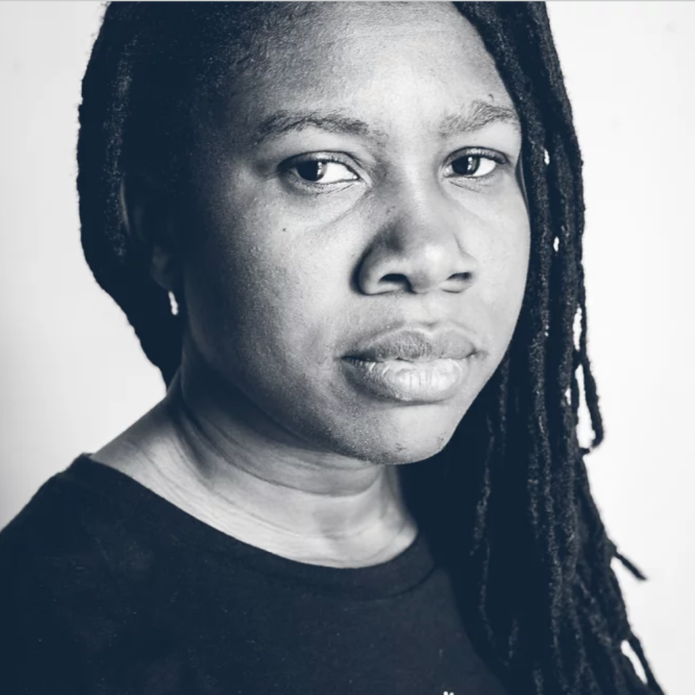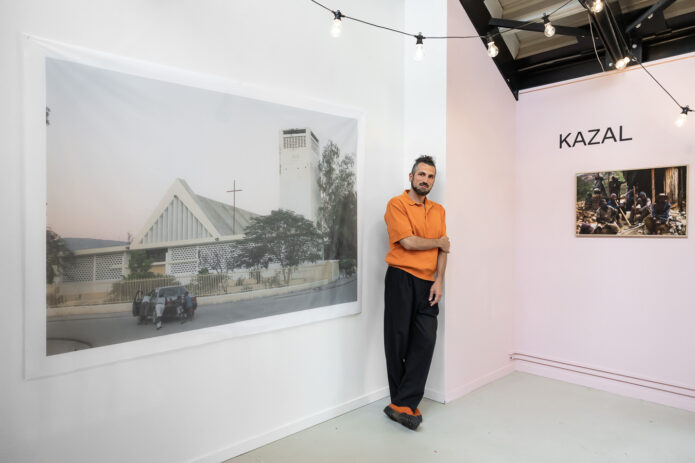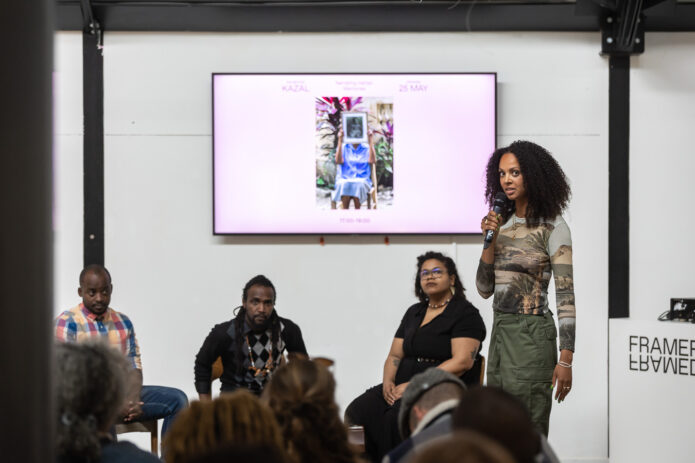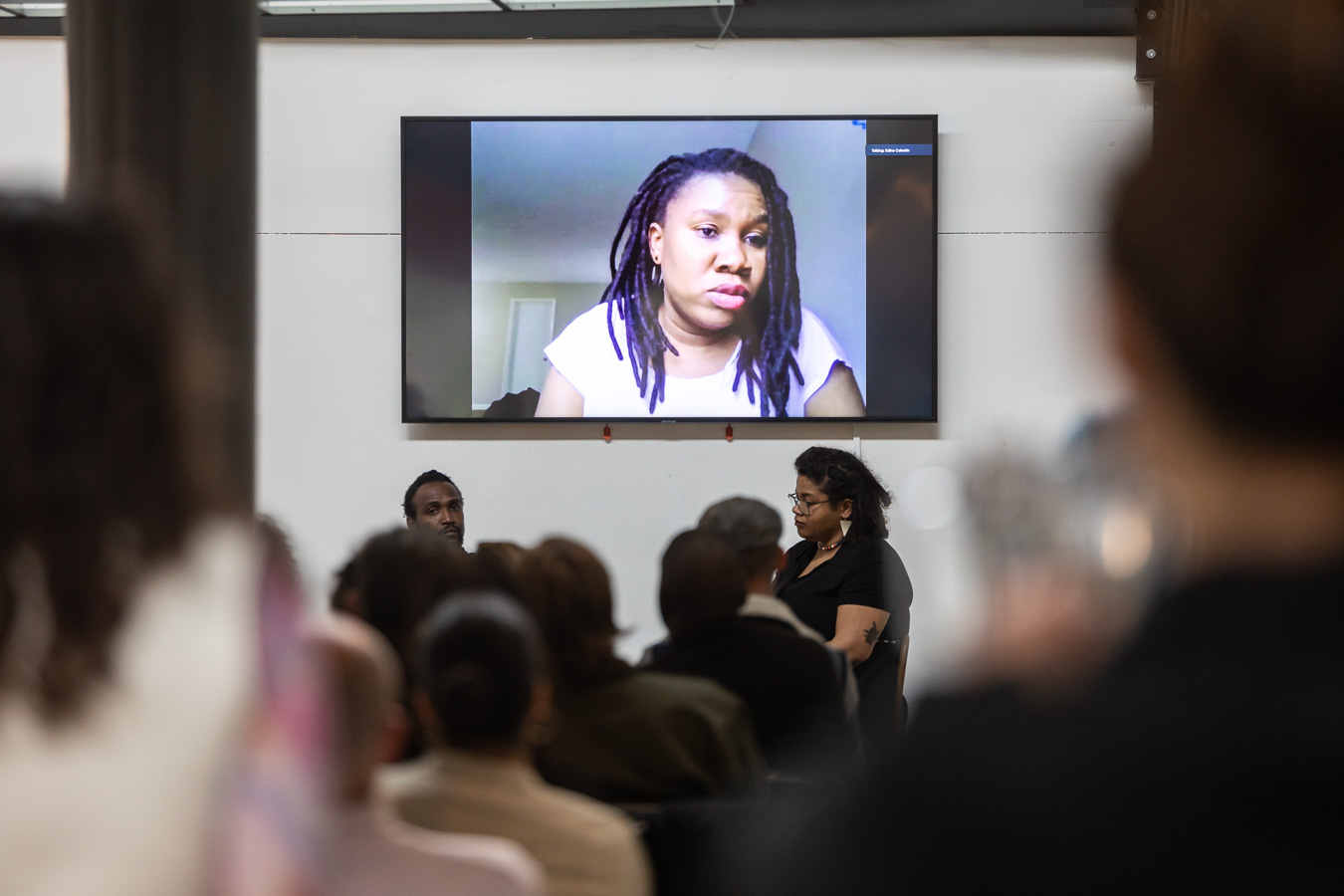 Edine Célestin during opening of the 'KAZAL - Narrating Haitian Memories'. Photo: Maarten Nauw / Framer Framed
Edine Célestin during opening of the 'KAZAL - Narrating Haitian Memories'. Photo: Maarten Nauw / Framer Framed Edine Célestin' Essay to accompany 'KAZAL - Narrating Haitian Memories'
Scroll down for French
By Edine Célestin
May 2022
I lived my childhood in a universe of restrictions. Forbidden from picking up flyers off the street, from reading graffiti on the walls, from looking the military in the eye.
I was born in 1984, two years before the fall of the dictatorship, but I grew up in fear of seeing the Tontons Macoutes force down our door, attack my father, rape my mother, exterminate my family… I was traumatised by the terror in my mother’s eyes at the mention of Duvalier’s name. Why, until the day she died, did she refuse to believe that times had changed?
At fourteen years old, as she was walking to the Petit-Trou-de-Nippes market, a commune in Southern Haiti where she lived with her parents, members of the Tontons Macoutes forced her into a truck and brought her to Port-au-Prince. It was customary to hold celebrations in honor of Duvalier, rounding up people from the provincial towns to create the illusion of a large crowd glorifying the covenant between Power and the People. After the celebration, my mother found herself alone and without a way back home. By chance, she found unexpected shelter in the form of domestic work for a foreigner. She lived in Port-au-Prince for two years before she could return home. Meanwhile, having thought her dead, her parents had held a mass in her memory.
Seven years ago, we went to Kazal, north of Port-au-Prince, in the hope of better understanding our family history and our country’s hidden history. During our first visits, we were stunned by the powerful emotions that arose, and continue to arise, from interacting with the people currently living there. In Kazal, the words to describe dictatorship are compelling and pour out in an uncontrollable stream. Those who were not born in 1969 nevertheless hold a brutal memory of the violence that transpired. During that fateful spring, the regime’s military and militia crushed a peasant uprising against the dictatorship that imposed abusive taxes and forbade the inhabitants from using water from the river flowing through their village. After a few weeks of hostility, beginning on the 27th of March to the 16th of April, at least 23 peasants were killed, 80 had disappeared, and 82 houses burned. The educated class call this event the “Kazal Massacre,” those from Kazal simply call it “The Affair.” Over the course of our conversations, the people of Kazal constantly listed the names of those who were summarily executed, buried alive, and imprisoned.
Only rare material traces and a few witnesses of this history have withstood the ruin and the passage of time. Nevertheless, emotion rises; you feel a lump in your throat to your throat as you visit these places, stare at these hitherto unknown faces, as you listen to those voices forgotten by history books, the courts, and the archives. In a country where History slips through your fingers, where memory crumbles, their voices fly away, misunderstood. Just like our mothers.
And 50 years later history repeats itself, we live with the same fears, forced to abandon our families, our homes. Everything we know. Death or exile; and exile itself is another form of death. A process where the soul of the displaced is forced to live in a country different from his body. I found myself wondering what remembrance is worth in a country where justice is sold to the highest bidder, where the executioners will live peacefully until the end of their days, where the only solace for the victims is the “Bondieu Bon”. [1] “Bay kou bliye, pote mak sonje” [2] they say, but our body is now in tatters from the beatings and our memory can no longer recall us. Times have changed and the executioners have changed colour and have become even more ferocious. We said “Never again”, but life did not keep its promise. We fought as best we could, tried to protect our children, but hope slipped through our fingers, and left a pile of corpses. Today, it is no longer the story of our mothers’, it is ours and just like our mothers we will have to tell it to our children, tempted to believe that in this way, never again, will it be repeated.
[1] “God is good”: attitude that wants us to turn to God to solve our problems. [2] The executioners forget, the victims are forever marked.KAZAL
Par Edine Célestin
Mai 2022
Mon enfance, je l’ai vécue dans un univers d’interdictions. Celles de ramasser les prospectus dans les rues, de lire les messages graffités sur les murs, de regarder les militaires dans les yeux.
Je suis née en 1984, deux ans avant la chute de la dictature mais j’ai grandi dans la peur de voir des tontons macoutes forcer notre porte, embarquer mon père, violer ma mère, exterminer la famille… J’ai été traumatisée par l’effroi qui figeait le visage de ma mère à l’évocation du nom Duvalier. Pourquoi, jusqu’à sa mort, a-t-elle refusé de croire que les temps avaient changé ?
A 14 ans, alors qu’elle s’en allait au marché à Petit-trou-de-Nippes, une commune du Sud d’Haïti où elle vivait avec ses parents, des tontons macoutes l’ont contrainte à monter dans un camion et l’ont emmenée à Port-au-Prince. Il était alors coutume d’organiser des fêtes en l’honneur de Duvalier, ramassant çà et là des gens dans les villes de province pour combler une assistance glorifiant l’entente du Pouvoir et du Peuple. La fête finie, ma mère s’est retrouvée livrée à elle-même, sans moyens de rentrer chez elle. Par chance, elle trouva un hébergement fortuit et un travail comme domestique chez des étrangers. Elle vécut deux ans à Port-au-Prince avant de pouvoir rentrer chez elle. La croyant morte, ses parents avaient fait chanter une messe en sa mémoire.
Il y a sept ans de cela, nous sommes partis à Kazal avec l’espoir de mieux comprendre notre histoire familiale et l’histoire occultée de notre pays. Lors de nos premières visites, nous étions surpris par la puissance des émotions qui, jusqu’à aujourd’hui, surgissaient des témoignages des habitants. À Kazal, les mots pour dire la dictature sont vifs et se déversent selon un flot incontrôlable. Celui qui n’était pas né lors des événements porte lui aussi un souvenir brutal de ce qui s’est passé en 1969. Au printemps de cette même année, des militaires et miliciens du régime écrasèrent dans le sang un soulèvement de paysans mécontents de payer les taxes abusives que leur imposait le pouvoir et l’interdiction d’utiliser l’eau de la rivière qui sillonne leur propre village. Après quelques semaines d’hostilités, entre le 27 mars et le 16 avril 1969, on dénombra au moins 23 paysans morts, 80 disparus et 82 maisons incendiées. Les plus doctes désignent ces évènements par « Massacre de Cazal », les Cazalais, eux, simplement par « l’affaire ». Lors de nos conversations, ces derniers égrènent sans cesse les noms de ceux qui ont été exécutés sommairement, enterrés vifs, faits prisonniers.
Seules de rares traces matérielles et quelques témoins de cette histoire ont pu résister au délabrement et au temps. Pourtant l’émotion monte à la gorge lorsque l’on visite ces lieux, fixe ces visages jusqu’alors inconnus, lorsqu’on écoute ces voix oubliées des livres d’histoire, des tribunaux et des archives du pays. Dans un pays où l’Histoire nous glisse entre les mains, où la mémoire s’effrite, leur parole se donne, s’envole, incomprise, presque bizarre. Tout comme celle de nos mères.
Et 50 ans plus tard l’histoire se répète, nous vivons les mêmes frayeurs et nous sommes contraints d’abandonner nos familles, nos maisons et tout ce que nous connaissons. La mort ou l’exil, mais l’exil en lui-même est une autre forme de mort. Un processus où l’âme du déplacé est contrainte de vivre dans un pays différent de son corps. Je me suis surprise à me demander que valent les travaux de mémoire dans un pays où la justice se vend au plus offrant, où les bourreaux après leurs crimes continueront à vivre paisiblement jusqu’à la fin de leurs jours, où la seule consolation des victimes est le « Bondieu bon »[1]. « Bay kou bliye, pote mak sonje »[2] dit-on, mais notre corps est à présent en lambeaux à force de recevoir des coups et la mémoire est aux abois à force de se rappeler à nous. Les temps ont changé et les bourreaux ont changé de couleurs, ils sont devenus plus féroces encore. Nous avons dit « Plus jamais », mais la vie n’a pas tenu sa promesse. Nous avons lutté du mieux que nous pouvons, avons tenté de protéger nos enfants, mais l’espoir a filé entre nos doigts laissant derrière lui un amas de cadavres. Ce n’est plus l’histoire de nos mères aujourd’hui, c’est la nôtre et tout comme nos mères nous aurons à la raconter à nos enfants, dans la tentation de croire qu’ainsi, jamais plus, elle ne se répètera.
[1] «Dieu est bon» attitude qui veut qu’on se tourne vers Dieu pour résoudre nos problèmes. [2] Les bourreaux oublient, les victimes sont à jamais marquées.Caribbean / Conflict / Photography /
Exhibitions
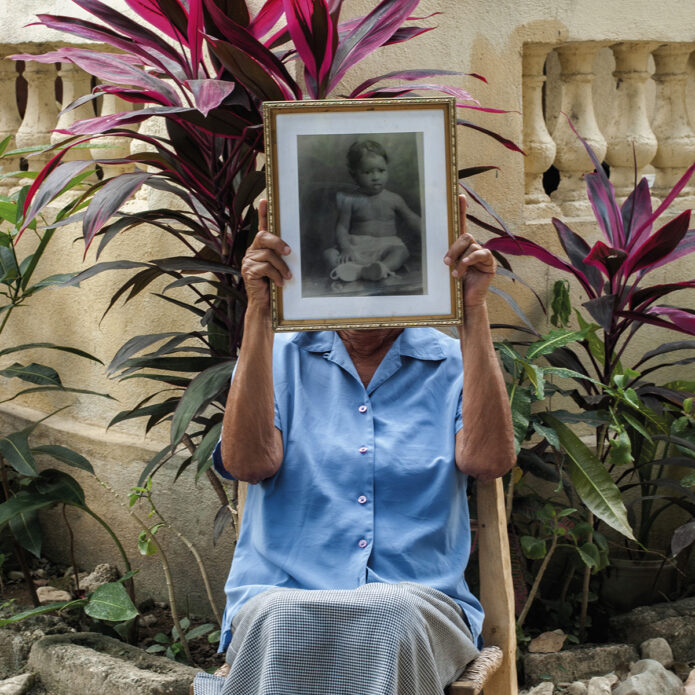
Exhibition: KAZAL – Narrating Haitian Memories
With Kolektif 2 Dimansyon & Tessa Mars
Agenda
Opening: KAZAL - Narrating Haitian Memories
With Georges H. Rouzier, Reginald Louissaint Jr., Tessa Mars & Alessandra Benedicty-Kokken
Network
